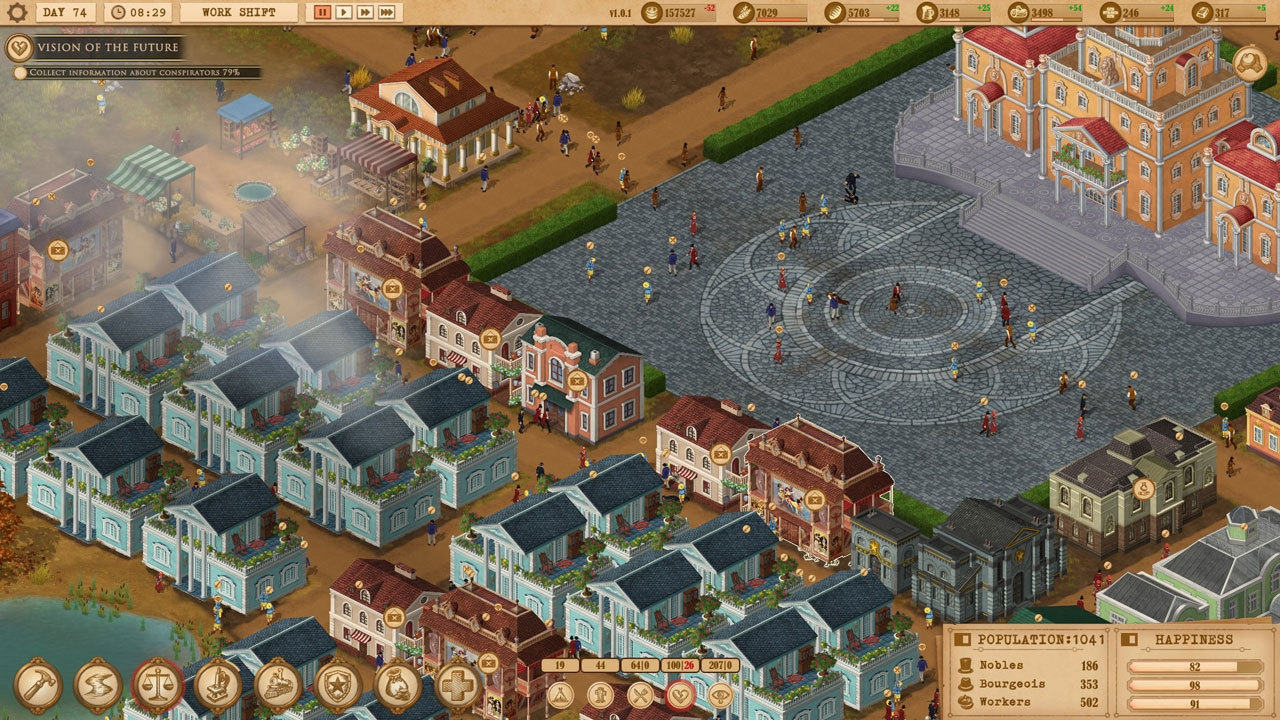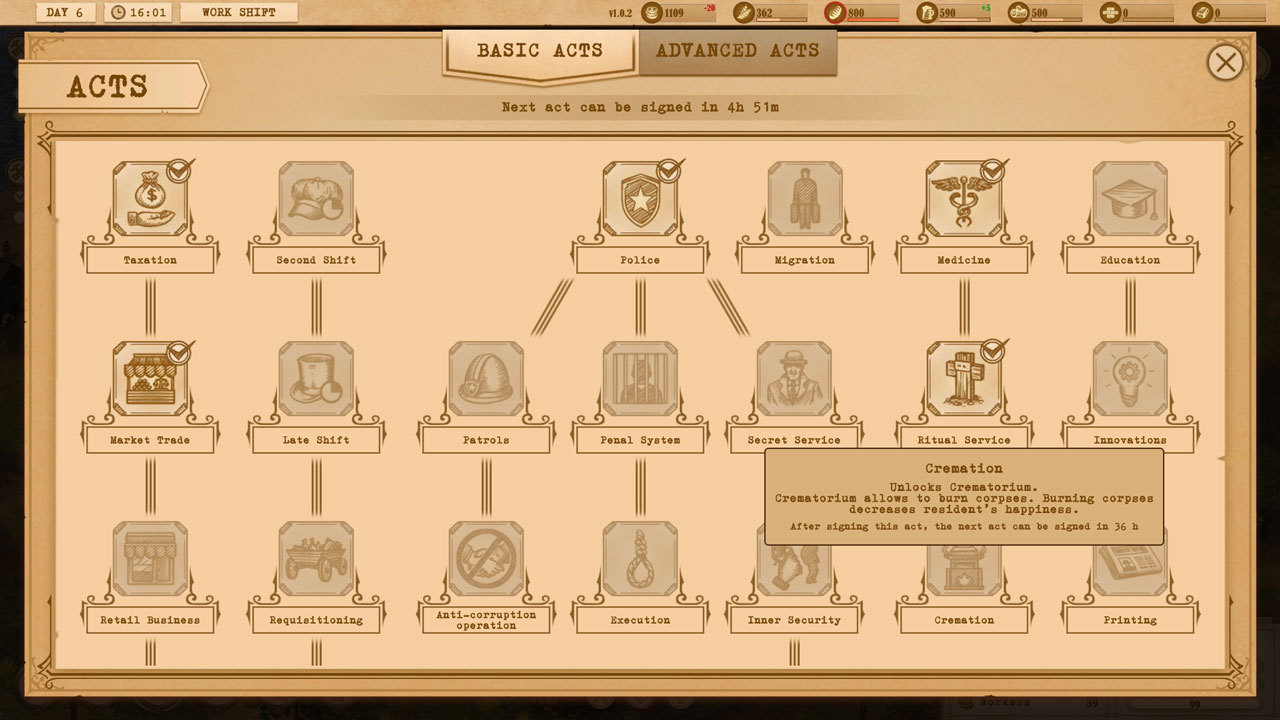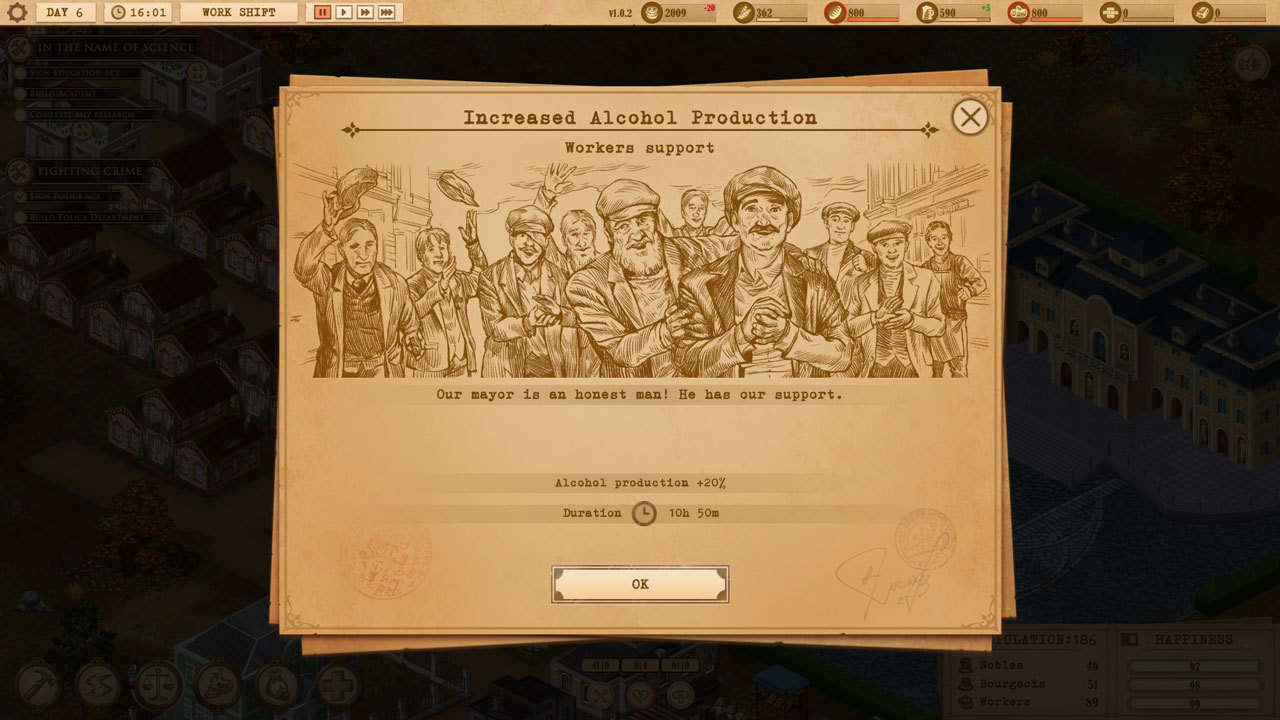Kapital: Sparks of Revolution PC Review
If you're seeking a challenging management experience that will keep you engaged for a long time, Kapital: Sparks of Revolution is the game for you.
Reviewed by RON on May 04, 2022
City Building Simulation Strategy games have a niche market to attend, and it’s not all that huge compared to genres like FPS or RPG. Gamers who play such simulations take things seriously. Soothing graphics, if not overly realistic, the gameplay has to be smooth and captivating. Many games have failed in the past to capture the attention of the fans of this genre. Series like the SimCity, Tropico, Anno, and a few others have set a standard many can’t match up to, while FrostPunk tried something entirely different, putting gamers in a survival-based City Building. That’s where the Lapovich Team comes with their Kapital: Sparks of Revolution, a game that revolves around societal crises and war. Soon after playing the game for a few hours, it appeared that the game’s focus isn’t entirely on building structures; it’s more about how you manage a society barely sticking together. The idea behind this game is brilliant on paper, but it’s not as easy to execute when you’re playing it.

Europe is in the midst of an economic and political catastrophe. In the wake of the horrific First World War, poverty and widening socio-economic divides split society. That's where Kapital: Sparks of Revolution puts us in command of a city devastated by the war. Our job is to rebuild the city that has been decimated due to the war. Managing a city with limited resources is what we'll be doing and striking a delicate balance between the requirements of citizens and the growth of the city. Anger-filled streets need extraordinary measures. But building cities requires a workforce, and to meet production demands; workers must be adaptable and live in deplorable circumstances hoping that life will get better soon.
The traditional formula of the genre is slightly altered in this game but mostly remains the same nonetheless. There are three distinct sections to each day. Eight hours of labor, eight hours of pleasure, and eight hours of repose. We'll find all the typical monetary management to building construction and adopting different policy-making, technology research, migration, and unpredictable occurrences that will push us to choose with direct consequences on our resources. Additional alterations are each section of society, their happiness, and the continual possibility of a civil revolt. The city comprises three groups: people who live, work, or live there. To get the right balance, we need to think about each group's needs.

Speaking of the group of people, Kapital divides its audience among three socioeconomic classes: nobles, bourgeois, and workers. Each social class has a distinct role in the city's economy. Nobles function as police officers, the bourgeoisie pay taxes, and workers supply the bulk of the working force. Then others will emerge, among them women of charity or education. Historically, it takes place during the conclusion of the First World War, which brought about substantial social and political changes due to this terrible disaster. However, the location and time are not accurately depicted in this case. History aside, the different classes have entirely different future views, and they are prepared to fight for it.
In the campaign mode, the game provides minimal resources, and to construct what is required, you either need to salvage war wreckage for materials or produce wood. We must constantly listen to the skirmishes of three guys from each class and attend to their requests. This begins with a sawmill and a bakery, besides the woodhouse for workers and cottages for nobles and bourgeois. The sawmill provides wood, the primary construction materials, while the grain is brought by the train for processing by the bakery. There will be many different buildings to explore, including a marketplace, hospitals, graveyards, alcohol plants, etc. Nevertheless, the reasoning is instantly apparent as abstract: for example, our inhabitants do not eat at home, and as a result, we construct Peg Houses for the workers and Bistros for the wealthier classes to feed them.

An essential theme in the game's plot is the conflict of different socioeconomic classes against one another. Everything in Kapital: Sparks of Revolution sticks to the concept of class conflict in a very literal and unambiguous manner. These differences eventually lead to conflicts that force us to choose between the city's interests and our morals. To avoid conflicts in general, we need to provide different facilities to each class of citizens. We ultimately find ourselves in an economy with growing problems and limited resources with limited resources. However, the game's primary purpose is to preserve the happiness of each social class in an appropriate proportion for lesser conflicts. This leads to the construction of several buildings with restrictions for different classes, and the more buildings there are for each class, the happier they will be. Our routes diverge as the choices grow more complex, and we eventually find ourselves in cahoots with all three classes, even forced to stop playing the game.
As the game progresses, it becomes increasingly difficult to understand. What looks to be a tiny town that is simple to maintain progressively transforms into a metropolis that is getting more chaotic. While unlocking the crematorium would benefit the management of the departed in our city and help us maintain a positive image with our residents, it will also cost us an image problem with those who live in the area. Decisions we make in the game might have good or negative consequences depending on the game's current state. The game intentionally forces players to indulge in social matters and serve one particular class. We won't be able to provide happiness or quality of life for everyone, regardless of class, since the buildings are all limited to one per estate.

Micromanagement shortly becomes a concern for Kapital: Sparks of Revolution. Certain parts of the game seem to focus on repetitive duties, with regular monitoring to determine whether that set of tasks has to be completed once again. Building upgrades are also a part of this. Upgraded versions of existing structures may become available via research and the tech tree as you advance. Routine maintenance jobs would be significant if they could be automated. There is no point in retooling a plant or fretting about the beginning and halting the railway service when I'm working on new projects. Additionally, these maintenance and upgrades use up resources, taking up a standard construction queue space. It might be frustrating to knock down an old structure and replace it with a new enhanced one when you are in the late stages of a game.
The advancement of the game is likewise extremely linear at this point. There appears to be a strict minimum and maximum set of programmed chores that must be followed precisely, with only slight deviations permitted. At the same time, waiting for the construction timers to run out soon becomes a significant part of the gameplay in this game. In the later stages, waiting for all of the timers to expire before proceeding with the construction or destroying any structures soon becomes tedious. Even though this mechanism is a standard for a city-building simulation, when you aren't entirely in control of the resources, all this idleness becomes laborious and sadly uninteresting.
The size of the map is likewise relatively small. For all appearances, although the area seems vast, the amount of ground you may develop on is restricted. This appears to be a deliberate constraint. I'm unsure whether I was unable to rotate the camera or the game doesn't have this feature, but this seemed like a significant drawback for me. For any city-building game, it is essential to rotate the map to measure the construction but Kapital: Sparks of Revolution doesn't provide it. You can zoom in and out but not rotate, which will confuse when scaling the buildings. Though the buildings can be rotated, this doesn't help much while the map is fixed. The same could be said for the mediocre game's visuals. The 2D visual is full of color and fine detail but doesn't give a lovely view for those who love building beautiful cities. Unfortunately, the level of polish doesn't extend to the user interface either, with slightly awkward menu positioning and small icons and text size.
In the end, it's a game about city administration that briefly incorporates different systems that don't have a significant impact on the overall experience. Although the game is hardly bad, it isn’t precisely good either. The game seemed incomplete and unpolished as in its current state, but more significant work is required to please the city-building sim fans. Lapovich Team came up with a brilliant idea but failed to balance social conflict management and city building with limited resources. If you're seeking a challenging management experience that will keep you engaged for a long time, Kapital: Sparks of Revolution is the game for you. At the same time, fans of city-building simulation can wait until the game is improved.
Sarwar Ron, NoobFeed
@SarwarRon | GamesCreed
Admin, NoobFeed
Verdict
60
Related News
No Data.

